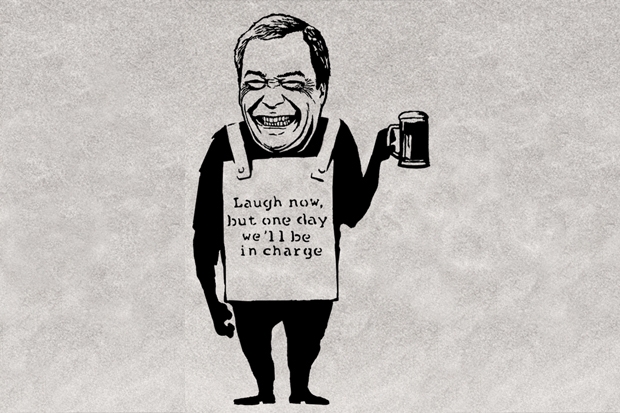Ukip is fighting its most important and difficult election campaign to date. If the party is victorious in May, there is a chance it will become an established Westminster force — around for many years to come. But if Ukip fails, its chance to crack the Commons will have passed and the party’s peak will be judged as being the Rochester & Strood and Clacton by-elections last year.
In the magazine this week, I go behind the scenes with Ukip to find out how the election campaign is going, and what victory looks like for the party. Here are five things I learnt from my time with the People’s Army in London, Essex and Kent.
-
The party thinks 2015 is only the beginning

Ukip’s poll rating remains around 10-15 per cent but some commentators have suggested the party is stalling. But like the Liberal Democrats, Ukip strategists say its national poll rating does not reflect what is happening on the ground. Aside from a handful of target seats it expects to do well in, such as Thurrock and Boston & Skegness, Ukip is confident there will be some surprises elsewhere. While Tories reckon Ukip will bag two to three seats, senior kippers are saying six to eight.
But the seats are only part of the equation. The party thinks that if Nigel Farage is elected in South Thanet and manages to win a number of seats, and puts in a good showing across the country, the 2015 election will only be the beginning of Ukip’s national success.
-
Ukip HQ’s operation has become more professional in the last six months

Ukip’s Raheem Kassam and Chris Bruni-Lowe.
Ukip could have won the Newark by-election. The incumbent Tory MP Patrick Mercer stood down over a lobbying scandal but Ukip plumped for Roger Helmer as its candidate and their local operation was lacking. After this, three key figures were recruited to party headquarters; to strengthen and professionalise the operation. The fruits were seen in the two by-election successes.
Chris Bruni-Lowe, the party’s new head of campaigns, defected to Ukip with Douglas Carswell and brought knowledge of voter targeting and use of data that was sorely lacking. Raheem Kassam, Farage’s senior adviser, joined from Breitbart London, to focus Farage’s messaging and has brought a consistency to his newspaper columns, speeches and media appearances. Paul Lambert, Ukip’s new head of communications, switched sides from the BBC and has fought fires and dealt successfully with the ever increasing interest from the media. All told, Ukip is starting to look less shambolic.
-
An Ed Miliband government is good for Ukip

Although Labour isn’t promising an EU referendum, Ukip see a Miliband-led government as helping their cause in the long term. Miliband and Balls will have no option but to continue with austerity, freezing public sector pay and slashing public spending. Labour risks becoming unpopular in areas heavily reliant on public spending, especially in the north where Conservatives are pariahs and the Liberal Democrats face a regional meltdown.
In this situation, where will disgruntled public sector workers turn? Ukip will pick up even more support. And if there happen to be any by-elections, Ukip will be ready to pounce.
-
Their biggest growth areas are in the North

Photo: Newcastle Chronicle.
While winning a ‘good number’ of seats is important to the party, most of these are likely to be in Kent and Essex. Strategists are watching constituencies elsewhere where the party hopes to come in second place. Throughout hundreds of seats in areas such as Rochdale and Tyneside, which notionally have huge Labour majorities, Ukip expects to push ahead of the other opposition parties without a huge amount of work — like ‘tapping paint on a rotten window frame,’ as one Ukip source puts it.
Although first-past-the-post usually means there are no rewards for coming second place, Ukip takes a different view and thinks coming second in seats from Birmingham to Hadrian’s Wall will boost the party’s national support. This doesn’t mean anything for 2015 but it could reap rewards in 2020. Expect to hear the phrase ‘2020 strategy’ coming from Ukip HQ very soon.
-
Nigel Farage is taking South Thanet very seriously

The Ukip leader was strangely quiet throughout January — leading to rumours that he was seriously ill. In fact, he was campaigning away, below the radar, in South Thanet. Calculating that there was nothing to be gained by popping up on TV every five minutes, Farage has been putting in the groundwork for his second bid in the seat to become its Member of Parliament. Unlike the last two elections, the odds in Farage’s favour this time. The incumbent (and popular) Tory MP Laura Sandys is standing down, plus he’s now a national figure with a significant profile he can use to benefit South Thanet.
But there is still a 17 per cent Tory majority to overturn. Lord Ashcroft thinks the race will be tight, while Survation see it as a clear win for Ukip. Farage knows he has to win here. If he doesn’t, it’s hard to see how he could remain leader of Ukip. His term doesn’t end until November 2018 but if the party’s power base shifts from Brussels to Westminster, he would have to go with it. And if Farage resigns, who would replace him? There are plenty of figures who want to take over but none of the likely successors has the charisma or ability to hold the different parts of Ukip together. So the risk is: if Nigel doesn’t win in South Thanet, Ukip will fall apart after May 7.






Comments